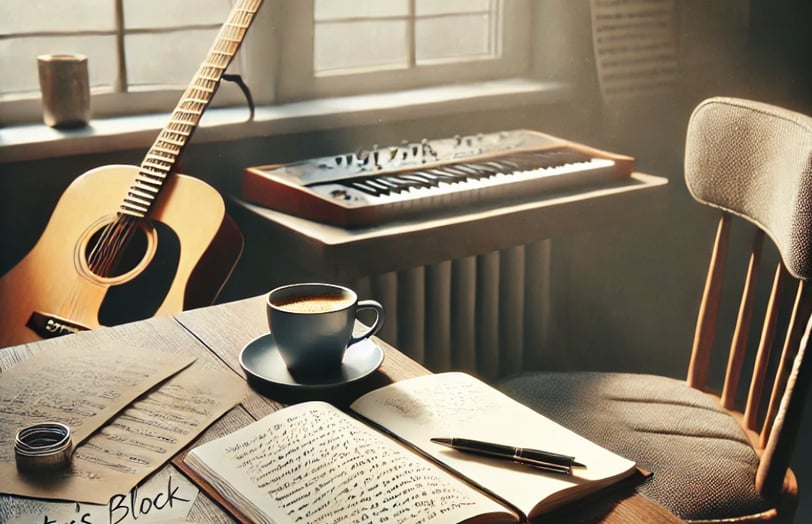Mastering the Creative Maze
A Profound Journey Through Songwriter's Block
1/9/20252 min read


Technological and Methodological Interventions
Cutting-Edge Songwriting Tools and Approaches
AI-Powered Creativity Assistants
Algorithmic lyric generators
Chord progression recommendation systems
Machine learning-based composition tools
Biofeedback Creative Technologies
Wearable devices tracking emotional states
Neurofeedback systems for creative optimization
Brainwave synchronization technologies
Unconventional Songwriting Methodologies
The Oblique Strategies Approach
Inspired by Brian Eno and Peter Schmidt's creativity cards
Introduces random, provocative prompts to disrupt linear thinking
Forces unexpected creative connections
Constraint-Based Composition
Deliberately limit musical parameters
Create songs using only specific instruments
Write lyrics with strict semantic or structural rules
Holistic Creative Ecosystem Development
Building a Sustainable Creative Infrastructure
Physical Environment Optimization
Design spaces that trigger creative states
Use color psychology in studio design
Create ritualistic preparation for creative work
Nutritional and Physiological Support
Brain-boosting dietary strategies
Sleep optimization techniques
Exercise protocols that enhance cognitive flexibility
Emotional Regulation Frameworks
Mindfulness and meditation practices
Journaling for emotional processing
Therapeutic approaches to creative blocks
Professional Perspectives: Wisdom from Musical Legends
Case Studies in Creative Resilience
Bob Dylan: Transformed creative blocks into entire musical movements
Leonard Cohen: Viewed songwriting as a meditative, iterative process
Joni Mitchell: Consistently reinvented her creative approach
Advanced Psychological Frameworks
The Four Stages of Creative Recovery
Acknowledgment: Recognizing the creative block
Deconstruction: Breaking down psychological barriers
Reconstruction: Rebuilding creative confidence
Transformation: Integrating the block as a growth experience
Your Comprehensive Roadmap to Musical Liberation
Writer's block is not a weakness—it's an invitation to deeper artistic understanding. It's a complex dialogue between your creative self and unexplored potential.
Unlock the Secrets of Limitless Musical Creativity!
Sign up below and get your FREE Ebook " From Pen to DAW: Mastering Music Composition in the Digital Age"
Evolutionary Disclaimer: Creativity is a living, breathing ecosystem. These strategies are dynamic tools for exploration, not rigid prescriptions. Your unique musical journey is the ultimate composition.
The Intricate Landscape of Creative Paralysis
Songwriter's block is not merely a temporary creative drought—it's a complex psychological terrain that challenges the very essence of musical expression. Far beyond a simple lack of ideas, it represents a multifaceted intersection of emotional, psychological, and creative barriers that can transform the most passionate musician into a hesitant artist wrestling with self-doubt.
The Neurological Underpinnings of Creative Blockage
Modern neuroscience reveals that writer's block is more than a metaphorical concept. It's a real neurological phenomenon involving:
Prefrontal Cortex Interference: The part of the brain responsible for critical thinking can sometimes overpower the creative centers
Dopamine Fluctuations: Creativity is closely linked to dopamine levels, which can be impacted by stress, fatigue, and emotional states
Neural Network Rigidity: Repetitive thinking patterns can create mental "ruts" that block innovative connections
Comprehensive Taxonomy of Creative Blockages
Psychological Barriers
Perfectionism's Paralytic Grip
Defined as an obsessive pursuit of flawlessness
Manifests as constant self-editing before ideas fully form
Creates a critical internal monologue that suffocates creativity
Impostor Syndrome in Songwriting
Persistent doubt about one's artistic legitimacy
Constant comparison with perceived "more talented" musicians
Fear of being "discovered" as a fraud
Emotional Exhaustion and Creative Burnout
Result of prolonged creative pressure
Symptomatic of emotional depletion
Often stems from external expectations and internal pressures
Physiological Factors
Sleep Deprivation: Reduces cognitive flexibility
Nutritional Deficiencies: Impact brain chemistry and creative thinking
Chronic Stress: Disrupts neural pathways associated with creativity
Revolutionary Strategies for Creative Liberation
Advanced Psychological Reframing Techniques
1. Cognitive Deconstruction of Creative Blocks
The Fragmentation Method
Break songwriting into microscopic, non-threatening tasks
Create a "low-stakes" creative environment
Remove the monolithic pressure of creating a "perfect" song
Practical Implementation:
Set a 10-minute timer for lyric generation
Focus on generating 4 lines without judgment
Treat each session as a experimental laboratory, not a performance
2. Neuroplastic Creativity Training
Modern neuroscience suggests that creativity is a trainable skill. By consistently challenging cognitive patterns, songwriters can literally rewire their brains for more flexible thinking.
Brain-Hacking Techniques:
Daily creative cross-training
Meditation and mindfulness practices
Deliberately introducing cognitive "disruptions"
